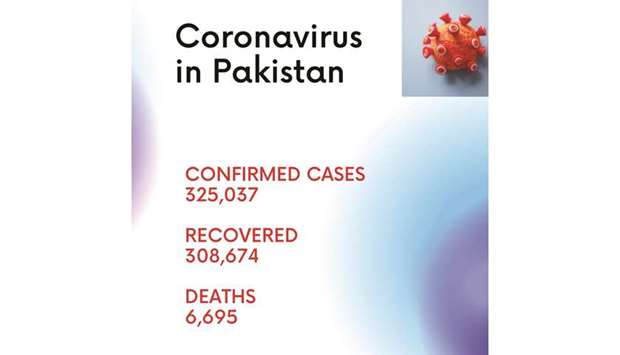During the session, the body noted a clear resurgence in virus cases and deaths in the country and warned an urgent and immediate need to ensure the implementation of standard operating procedures (SOPs) for prevention of the disease.
The body issued a statement yesterday which read: “NCOC is closely monitoring the situation. If there is no improvement in SOPs compliance observed, NCOC will have no choice but to revert to strict measures leading to re-closures of services.”
The chief secretaries, who attended the meeting, were directed to “strictly implement” SOPs and take “strict punitive actions” in case of violation.
It also directed officials to put a “special focus” on the perceived high-risk sectors of transport, markets, marriage halls, restaurants and public gatherings.
“Wearing of mask and social distancing must be ensured. Administrative actions be initiated against violators,” the NCOC told the chief secretaries.
Last week, Federal Minister for Planning, Development, Reforms and Initiatives Asad Umar had hinted that the government may have to re-impose lockdown in the country to curb the virus spread, which will have “negative effects” on the livelihoods of the people.
In a series of tweets on the other day, Umar had said the national positivity of Covid-19 cases was 2.37 per cent a day earlier, which is the highest in more than 50 days.
These are the “unmistakable signs of the rise of coronavirus” in Pakistan, he had noted.
The federal cabinet yesterday also expressed serious concern over increase in coronavirus cases in the country and asked people to take necessary precautions against expected second wave of the pandemic.
The meeting chaired by Prime Minister Imran Khan in Islamabad was informed about the rise in number of new cases in the current month as compared to the figures of July and August.
It was pointed that the rate of positivity had risen to two per cent, while the number of deaths had also gone up in two digits.
The cabinet expressed commitment to ensure the availability of ample wheat across the country besides controlling its prices.
The cabinet was briefed on the import of wheat reserves in the country and the commodity procured by public sector.
The meeting was apprised that Punjab government had assured the availability of wheat at Utility Stores while Sindh government had given a similar commitment on wheat supply to flour mills in line with their demand.
The prime minister directed detailed report in next cabinet meeting on wheat and sugar, including their prices and requirement.
Meanwhile, the Ministry of National Health Services, Regulation and Coordination yesterday said that over 8,000 health workers in Pakistan have now been test positive for novel coronavirus.
As of October 19, 87 workers lost their battle against the deadly virus, while the number of infected health professionals had reached 8,272.
Since the outbreak of the global pandemic in Pakistan in late February, 7,902 of these healthcare professionals have successfully recovered.
The official data also notes that of the sickened healthcare workers, 61 per cent are doctors. Additionally, 927 nurses have tested positive.
Khyber Pakhtunkhwa tops the list for most infected health workers with 2,494; followed by Sindh, 2,255; Punjab, 1,815; Islamabad, 647; Balochistan, 536; Azad Jammu and Kashmir, 323; and lastly, Gilgit-Baltistan, 202.
In terms of causalities, Sindh tops the list with 34 followed by Khyber Pakhtunkhwa 21.

